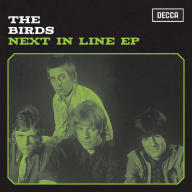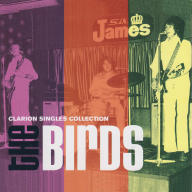The group seemed poised for success. Their bookings placed them ahead of the Pretty Things and the early Jeff Beck group the Tridents, and they were billed with the Who on some of the same gigs. In that company, there seemed to be no way that they could fail, especially with their sound, a loud, crunchy brand of British rhythm & blues-based rock, roughly akin to early Who, the Yardbirds, and the Kinks.
Disaster struck the band from a completely unexpected quarter -- across the Atlantic -- at in the spring of 1965, however. Fresh off of their first U.S. hit came a Los Angeles-based quintet called the Byrds. Their debut single, Mr. Tambourine Man, released on the newly established British CBS Records label, was burning up the British charts, and Leaving Here by the Birds was left there, on record store shelves (when it was ordered at all). That summer the rival group toured England for the first time, and although the Birds' manager tried to take legal action, it was to no avail -- the spellings were different, and both groups' claim to the name were about equally good. A third Decca single in late 1965 brought their relationship with that label to an end. The group then moved to Reaction Records, at first under the name Birds Birds, but their debut single for the label, Say Those Magic Words, was delayed in release for almost a year due to a contractual dispute. They also cut a version of Pete Townshend's Run Run Run highlighted by Wood's crunchy guitar and McKenzie's punked-out vocals, that could've given the Who a run for their money in a chase up the charts by rival singles. And they got one delightfully bizarre film appearance under their belt, performing a Ron Wood/Tony Munroe song, That's All I Need, in the horror chiller #The Deadly Bees, in 1966. Munroe was out of the band not long after, and Wood left in 1967, passing through the lineup of the Jeff Beck Group before joining the reconfigured (Small) Faces with Rod Stewart in 1969.
The Birds were one of the better bands of their era, as evidenced by the large following they built up from their live performances, playing a hard, loud brand of R&B, with polished vocals and a forceful, crunchy guitar sound. They weren't far removed from the Small Faces or the Who in sound, and perhaps they might've fared better, or had a longer run at success, if they hadn't been signed to a label that already had the Small Faces and the Rolling Stones under contract. The name confusion probably killed whatever chance they had of cracking the English charts, as well as eclipsing their musical virtues for posterity. ~ Bruce Eder, Rovi














